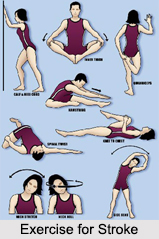 Stroke, also known as "Apoplexy", is a sudden acute disturbance of brain function of vascular origin. It may result in unconsciousness, paralysis or death. It is the most common form of brain disease, which can occur at any age, although, the risk increases greatly in the older years of life.
Stroke, also known as "Apoplexy", is a sudden acute disturbance of brain function of vascular origin. It may result in unconsciousness, paralysis or death. It is the most common form of brain disease, which can occur at any age, although, the risk increases greatly in the older years of life.
Types of Stroke
There are 3 main kinds of stroke which are discussed below;
Ischemic Strokes: Ischemic Strokes are caused by a blockage cutting off the blood supply to the brain.
Hemorrhagic Strokes: Strokes can also be caused by a bleeding in or around the brain which is known as Haemorrhagic Stroke.
Transient Ischemic Attacks: Transient Ischemic Attack (TIA) is also known as a mini-stroke. It is the same as a stroke, except that the symptoms last for a short amount of time and no longer than 24 hours.
Symptoms of Stroke
Usually, the first sign of stroke is dizziness, followed by nausea and vomiting, and later by weakness of the body. The patient may complain of a severe headache, and may even have a convulsion, or pass into a coma from which he/she cannot be aroused for some time. The person may be completely paralysed on one side and may not be able to speak.
Many strokes occur suddenly and tend to clear after a few hours. In more serious cases, the patient may remain in a deep coma for several days. He/she may have a fever, a rapid pulse and difficulty in breathing. This condition may arise due to haemorrhage of the brain. If the coma lasts for more than 6 hours then the patient passes periods of convulsions with stiffness in the neck and the eyes are turned sharply toward the paralysed side. A severe haemorrhage may prove fatal in 2 or 3 days, especially if the patient has a high fever with a rapid pulse.
Causes of Stroke
The brain is a delicate organ requiring a constant supply of blood. A stroke occurs when one of the vessels leading to a portion of the brain becomes blocked by a blood clot. This may be due to inflammation, arteriosclerosis, or the presence of a clot or embolus from the heart. Occasionally one of the vessels leading to the brain may rupture because of a small aneurysm or enlargement in the wall of the vessel. This will cause a serious haemorrhage. A sudden rise in blood pressure caused by emotion like anger may rupture the aneurysm. Most strokes are due to thrombosis, or clotting of blood within the vessel. When this happens, that portion of the brain becomes necrotic and dies.
Good nursing care is of utmost importance, especially during the acute stage. The patient should be made to rest in bed, and the body should be turned frequently from side to side to prevent development of pressure sores. Healthy eating can reduce the risk of stroke. Eating a diet low in fat and salt and high in fruits and vegetables reduces the risk factors like high blood cholesterol, high blood pressure, being overweight and diabetes.
The patient should avoid tea, coffee, white flour, sugar and all products made from them as well as all flesh foods. One should also avoid spices, condiments, pickles, tinned and frozen foods, fried foods and other foods, which are difficult to digest. The consumption of alcoholic beverages and smoking, wherever habitual, should be stopped completely.
Exercises for Stroke
The patient should be encouraged to use the paralysed limbs and move all the joints several times daily. The paralysed muscles should be gently massaged. As soon as possible, the patient should come out of bed and walk around the room. When the patient is able to move about, he/she should take breathing exercise and other exercises daily, together with the daily friction. Fresh air and outdoor exercises, as far as possible and clean wholesome living will prevent occurrence of further strokes. All undue nervous excitement, needless worry and excessive strain must be avoided.




